

Keeping Aging Loved Ones with Dementia from Wandering. Dementia is an umbrella term for various diseases that affect the cognitive abilities of individuals.
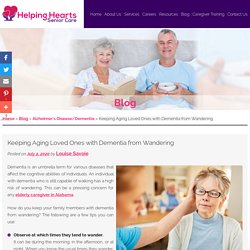
An individual with dementia who is still capable of walking has a high risk of wandering. This can be a pressing concern for any elderly caregiver in Alabama. How do you keep your family members with dementia from wandering? The following are a few tips you can use: Home Safety Tips for Patients with Alzheimer’s Disease. Home safety should be the top concern when caring for a patient with Alzheimer’s disease.
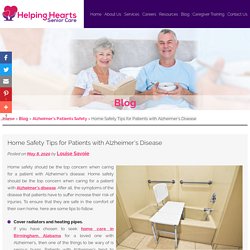
Home safety should be the top concern when caring for a patient with Alzheimer’s disease. After all, the symptoms of the disease that patients have to suffer increase their risk of injuries. To ensure that they are safe in the comfort of their own home, here are some tips to follow: Avoiding Malnutrition as a Senior. Generally, older adults are at risk of inadequate nutrition.
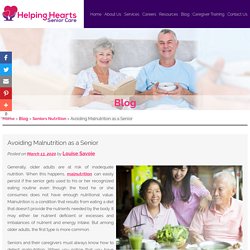
When this happens, malnutrition can easily persist if the senior gets used to his or her recognized eating routine even though the food he or she consumes does not have enough nutritional value. Malnutrition is a condition that results from eating a diet that doesn’t provide the nutrients needed by the body. Brain Exercises for Seniors. One of the many risk factors of developing Alzheimer’s disease and other dementias is reduced use of brain cells due to minimal brain activity.

Others include genetics, Down’s syndrome, head injuries, cardiovascular disease, untreated depression, loneliness, and living a sedentary lifestyle. But it’s never too late to improve your brain function and activity. Even at an old age, you can still exercise your brain and decrease your risk of acquiring Alzheimer’s disease. With the help of senior care services that are offered in well-trusted homecare facilities or caregiving homes, the elderly can enjoy themselves while exercising their minds.
They can do arts and crafts, play puzzles, bingo, online games, memory games, group trivia, chess, and other board games. Dementia: Signs, Symptoms, and How It Affects You. Memory loss can be a tell-tale sign of dementia.
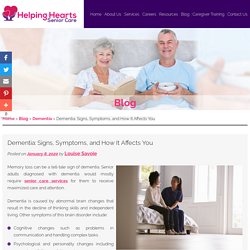
Senior adults diagnosed with dementia would mostly require senior care services for them to receive maximized care and attention. Dementia is caused by abnormal brain changes that result in the decline of thinking skills and independent living. Other symptoms of this brain disorder include: Cognitive changes such as problems in communication and handling complex tasks.Psychological and personality changes including paranoia, agitation, and depression.Poor nutrition because someone with progressive dementia would reduce or stop eating.Inability to take care of oneself because this interferes with their daily tasks like bathing, medication, brushing, and other self-care activities.
Prevention of Falls and Injuries. Seniors have higher risks of falls and injuries.
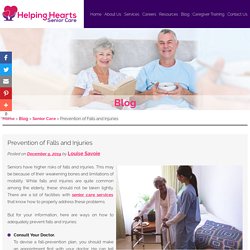
This may be because of their weakening bones and limitations of mobility. While falls and injuries are quite common among the elderly, these should not be taken lightly. There are a lot of facilities with senior care services that know how to properly address these problems. But for your information, here are ways on how to adequately prevent falls and injuries: Why Home Care Is the Best Option. Elderly individuals with complex care requirements need to have multiple care settings.

Oftentimes, when your loved one needs care, it’s difficult to decide the best route. Is it better to have them at a nursing home? Is it more financially sound to have a family member or friend care for the elderly? Proper After-Stroke Care for Seniors. Stroke is an ailment that affects the arteries leading to and within the brain.
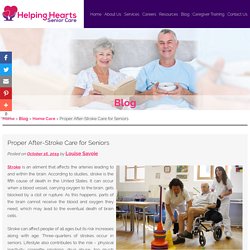
According to studies, stroke is the fifth cause of death in the United States. It can occur when a blood vessel, carrying oxygen to the brain, gets blocked by a clot or rupture. As this happens, parts of the brain cannot receive the blood and oxygen they need, which may lead to the eventual death of brain cells. Stroke can affect people of all ages but its risk increases along with age.
Three-quarters of strokes occur in seniors. That is why it is important for seniors to always have assistance at home. If you reside in the central northern part of the US, contact an elderly caregiver in Alabama to receive the proper after-stroke care. Learn More About the Different Stages of Dementia. Dementia is a category of diseases associated with memory loss and deterioration of mental functions.
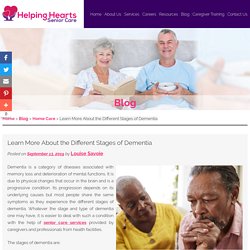
It is due to physical changes that occur in the brain and is a progressive condition. Its progression depends on its underlying causes but most people share the same symptoms as they experience the different stages of dementia. Home Living in Your Golden Years: Why Home Care? People get old.

In fact, many people would be lucky to grow old but growing old also comes with a few drawbacks. The drawbacks are not guaranteed, but they can happen. Getting Older and Getting Better. The nature of linear time is such that every now and then, a person will age to the point that they are old. Caring for Seniors When They are Ill.
No one feels pleasant when they’re sick, but when you’re older, it becomes more difficult to battle some illnesses.